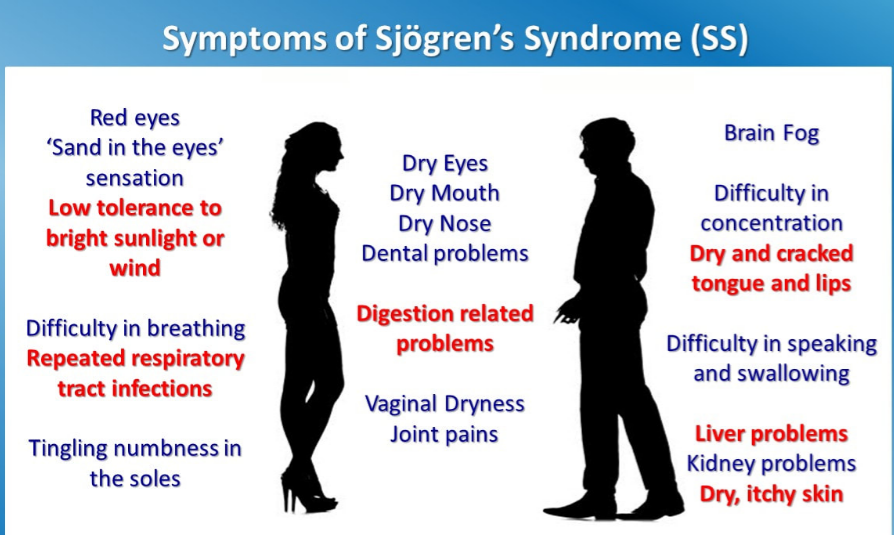What is Sjogren’s Syndrome?
Sjogren’s syndrome, also called Sicca syndrome, is a common autoimmune disorder that causes dry eyes and mouth, and its long-term effects can be serious.
Sjogren’s syndrome primarily affects the exocrine glands, resulting in decreased production of saliva and tears.
While Sicca syndrome mostly affects the eyes and the salivary glands, it may affect other parts of the body as well.
What are the Causes of Sjogren’s syndrome?
Sjogren’s syndrome is more typically seen in women, not contagious since it’s an autoimmune disorder, which means a dysfunctional immune system causes it.
However, it can be hereditary and serious in both male and female because the root causes of Sjogren’s syndrome is a mix of genetic and environmental influence.
There are also 2 types of Sjogren’s syndrome, primary, and secondary Sjogren syndrome. The former occurs without underlying rheumatic disorder while the latter occurs with the presence of rheumatic disease.
Stages of Sjogren’s syndrome
There are 3 stages of Sjogren’s syndrome, from mild to severe.
- Glandular stage
- Extraglandular stage, and
- Extraglandular SS with lymphoid malignancy.
Sjogren’s syndrome Warning Signs and Symptoms
The common symptoms and warning signs to watch are persistent dry eyes and dry mouth, Tiredness, throat problems such as difficulty in swallowing food or speaking, frequent dental cavities, and dry skin or rashes.
Since the illness progresses slowly, the classic symptoms of dry eyes, as well as mouth, might take years to manifest. Rapid onset, on the other hand, is possible.
Symptoms might be minor, moderate, or severe, and the course of the disease is often unexpected.
Does Sjogren’s syndrome cause weight gain?
Sjogren’s syndrome has not been linked to an increase in weight, however, some other complications of the disorder can cause slight weight gain.
Moreso, steroids can be used as complementary drugs, and they can lead to a weight gain for the patient.
Does Sjogren’s syndrome feet?
Painful feet, joint pain, swelling, or stiffness are complications of Sjogren’s syndrome.
What are Foods and drinks that can make Sjogren’s syndrome worse?
If you’re suffering from sicca, you should avoid taking spicy foods, red meat, soda, gluten, acidic foods, and anything that has a high content of caffeine.
You should also avoid alcohol, smoking tobacco, and cigarette. Instead, talk to your doctor to adjust your diet plan and eat healthy foods.
What Happens if Sjogren’s syndrome is Not Treated?
Sjogren’s syndrome can also lead to complications such as blindness, damaged lungs, liver, and kidneys, dental destruction, and non-Hodgkin lymphoma, and affects the nervous system, leading to a range of additional symptoms.
If you experience any of the signs and symptoms of Sjogren’s disorder, it is important to consult your medical doctor to determine the cause and offer the best treatment for Sjogren’s syndrome for you.
Without treatment, the life expectancy of a person living with Sjogren’s syndrome is between 15 to 25 years.
What Medication is used for Sjogren’s syndrome?
There are different methods of Sjogren’s diagnosis and treatments, and upon confirmation of the disorder, Hydroxychloroquine and Methotrexate are common prescription drugs to suppress the symptoms.
